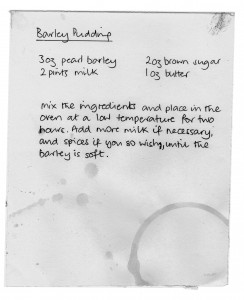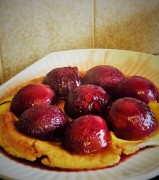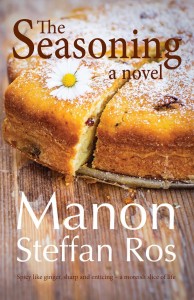Food Is My Heathcliff
 It starts, as all good things should, with a pudding.
It starts, as all good things should, with a pudding.
In my grandmother’s kitchen, my dear Nain (which is what we call our grandmothers here in North Wales) is telling me about her own grandmother. There is a common thread which runs through our family- we love our grandmas. Nain is the keeper of my secrets, the healer of my wounds, and my very best friend. Her nain was similarly adored. And now, on a dreary Tuesday in February, I am handed a precious inheritance.
It is a recipe.
 When I get home, I get cooking. It is basically a rice pudding, but made with pearl barley instead of rice. I slosh the milk into the hard, bead-like barley. Sugar is added, generously- I am always generous with sugar. I place the bowl in the oven for hours, until the solid beans soften and swell with milk. And then, I sit down at my own kitchen table with my great-great grandmother’s barley pudding.
When I get home, I get cooking. It is basically a rice pudding, but made with pearl barley instead of rice. I slosh the milk into the hard, bead-like barley. Sugar is added, generously- I am always generous with sugar. I place the bowl in the oven for hours, until the solid beans soften and swell with milk. And then, I sit down at my own kitchen table with my great-great grandmother’s barley pudding.
It feels as if she is here.
It tastes soft and sweet and comforting, like the memory of a long-forgotten embrace. The smell of her kitchen is now in my kitchen. This is the closest I will ever get to her. I imagine her here, pleased that she is still remembered and loved.
My son trots in, and takes a mouthful of the barley pudding. ‘Yuk,’ he says, ruining my sentimental reverie. ‘Can I have a Kit Kat?’
 Alas, barley pudding isn’t for everyone. But that recipe, cooked in my kitchen a decade ago, has stayed with me. Why did a taste make me feel so close to someone I’d never met? Why was it more poignant than looking at her photograph, or walking past where she used to live?
Alas, barley pudding isn’t for everyone. But that recipe, cooked in my kitchen a decade ago, has stayed with me. Why did a taste make me feel so close to someone I’d never met? Why was it more poignant than looking at her photograph, or walking past where she used to live?
Taste has always been my friend. Cooking has always been a comfort. The giving of food has always been a way of giving love, and I only truly realised the importance of food as an emotional crutch when I cooked that barley pudding. I started writing about food- before long, I had a whole novel, peppered with recipes. It was published, and people seemed to like it. They understood, I think, that food is not just fuel. It can be lovely and sensual and horrid and sexy and comforting.
I realised that often, my generation- I was born in ’83- has a complex love-hate relationship with food. I started to watch people as they ate, and listen to the way they spoke about food. Fatty, sugary foods were delicious but bad. Leaves were a healthy penance.
 Overindulgence in food is not celebrated in the same way as, say, alcohol. People sometimes brag that they feel rubbish because they’ve had a whole bottle of wine the previous night- you never hear anyone say ‘I ate a whole stuffed crust pizza and a box of after dinner mints last night, I’ve got terrible indegestion.’ It’s a habit to be hidden. And socially, I think that there’s more disgust shown towards people who overindulge in food than towards those who overindulge in alcohol or nicotine. We have websites and magazines dedicated to ridiculing tiny imperfections on bodies that, quite frankly, I would kill for. Ed Milliband had more flak for that bacon buttie photo than for any political blip.
Overindulgence in food is not celebrated in the same way as, say, alcohol. People sometimes brag that they feel rubbish because they’ve had a whole bottle of wine the previous night- you never hear anyone say ‘I ate a whole stuffed crust pizza and a box of after dinner mints last night, I’ve got terrible indegestion.’ It’s a habit to be hidden. And socially, I think that there’s more disgust shown towards people who overindulge in food than towards those who overindulge in alcohol or nicotine. We have websites and magazines dedicated to ridiculing tiny imperfections on bodies that, quite frankly, I would kill for. Ed Milliband had more flak for that bacon buttie photo than for any political blip.
My own relationship with food is a complex one. Sometimes it is easy to be balanced and healthy- more often than not, I am either ashamedly overeating or miserably dieting. Sometimes, I can eat unselfconsciously- occasionally, I can’t bring myself to eat in front of others. I have eaten until I’m sick and have dieted until I’m sick, too. It’s like having a tempestuous love affair. Yes, that’s exactly it. Food is my Heathcliff. That miserable git I can’t help but love.
What would my great great grandmother make of my culinary navel-gazing? She probably wouldn’t understand. She had to scrimp and save to feed her family- there was no cheap, tasty, mass-produced food in her day (and do let’s stop snobbishly pretending that all ready meals taste horrible. They’re full of salt and sugar, are very very bad for you and they taste LOVELY.) Perhaps she never had to exercise self-control with food- maybe there was never enough. I never met her, but across the years, the wars, the generations, she became real to me one day over a pudding we shared. That’s what a taste can do to you. It has its own story.
—
Buy Manon’s novel The Seasoning HERE
Category: Contemporary Women Writers, On Writing






























